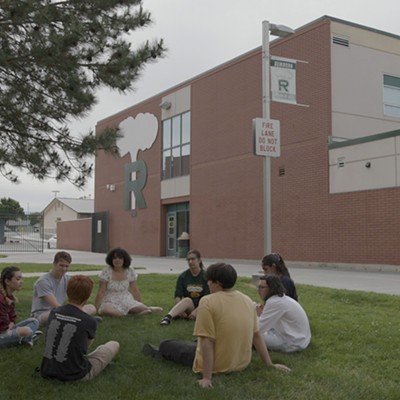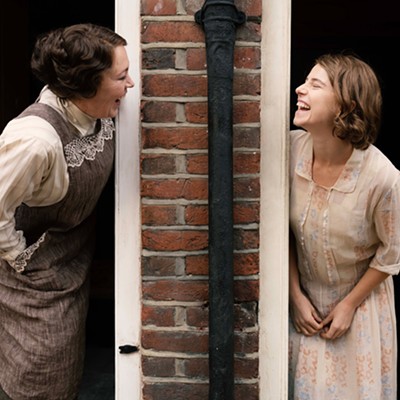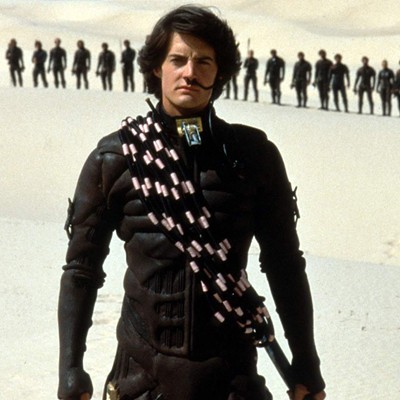The scariest thing in Hereditary isn't literal possession from beyond the grave, but the more mundane idea that it's impossible to shake the toxic legacy of your own family members, no matter how hard you try.
For Annie Graham (Toni Collette), that means forever being tied to her secretive, emotionally abusive, mentally ill mother, whose death sets Annie's family on a downward spiral of depression, anger and delusion — oh, and literal possession from beyond the grave.
At first, it seems like that possession is taking hold in Annie's daughter Charlie (newcomer Milly Shapiro), a strange, quiet girl with a penchant for building grotesque sculptures out of everyday objects and making an unsettling clicking noise with her mouth (which becomes the movie's aural motif). Charlie was very close (maybe too close) with Annie's late mother, and both mother and daughter see apparitions of the dead woman around the family's isolated Utah home. Whatever clandestine, possibly pagan activities that Annie's mother was involved with while she was alive have seeped into Charlie's erratic, sometimes sinister behavior.
Charlie's connection to her grandmother turns out to be a bit of misdirection, though, and the movie takes an even darker, more brutal turn following an ill-fated night out at a party for Charlie and her teenage brother Peter (Alex Wolff). That's when the family really starts to collapse, as Annie becomes increasingly hysterical and desperate, turning to a mysterious woman (Ann Dowd) she meets in a grief support group, who offers Annie a chance to reach out to the afterlife.
That, of course, never goes well for anyone in a horror movie, and the results for Annie and her family are predictably disastrous, although the movie's specific plot developments don't exactly follow a standard horror template. After an accident involving Charlie and Peter, the movie slows down considerably, turning into a tense chamber drama about paralyzing, all-consuming grief, with the more familiar horror elements simmering in the background.
Annie can't deal with the loss she's experienced, and she begins obsessively exploring her mother's mysterious past, becoming convinced that someone or something is invading the family home from beyond. Her pragmatic husband Steve (Gabriel Byrne) does what he can to comfort her, but he's a diminishing voice of reason as Annie loses her grip on reality. Peter, too, starts coming undone, and mother and son feed into each other's delusions (or hauntings) in dangerous, unhealthy ways.
Writer-director Ari Aster, in his feature debut, keeps the tone off-kilter and moody, thanks to Colin Stetson's eerie score and the detailed production design from Grace Yun, which envelops the Grahams in a fragile, dollhouse-like environment that resembles the meticulous miniatures Annie creates for museums and art galleries. The camera pushes in on one of those miniatures in the movie's opening shot, eventually transitioning seamlessly from the model of the Grahams' home to the real thing, positioning the characters as painted figures trapped in a constructed, sealed-off world.
That world is certainly constructed with care, and Hereditary is a visually assured debut from Aster, with numerous striking and unnerving images. Simple touches like scenes that change from day to night as if by the flick of a switch show how the characters' lives are falling apart, even when nothing explicitly horrific is happening. Aster is less successful at piecing all those moments together, and at connecting the themes of grief and family dysfunction to the sometimes cheesy horror elements, including clichés like Annie discovering a book on the supernatural with conveniently underlined passages.
Collette brings real anguish and ferocity to her performance, though, making almost all of Annie's sometimes inscrutable actions understandable within the context of her grief and anxiety. Byrne balances out Collette's histrionics by making Steve into a subdued, almost unobtrusive presence in his own home among his own family. Wolff doesn't quite have Collette's skills at portraying a character who frequently falls to pieces, and it's a shame that Shapiro's deeply creepy Charlie checks out of the movie early, since she's much more mesmerizing to watch, providing the movie with its most genuinely chilling moments.
After spending most of the movie stringing together a series of those moments, which don't quite add up to a cohesive whole, Aster then goes all-in on over-the-top horror, and despite the vague hints that have been building, it's a bit jarring to move from psychological torment to demons and blood and cultists. There are still plenty of unanswered questions by the time the movie ends, but the answers that are given all come in a final rush of exposition, as if Aster suddenly realized he had to justify all the preceding weirdness. That justification is both excessive and dissatisfying, but the movie has enough memorably disturbing images to stick in viewers' minds without any explanation needed. ♦




















